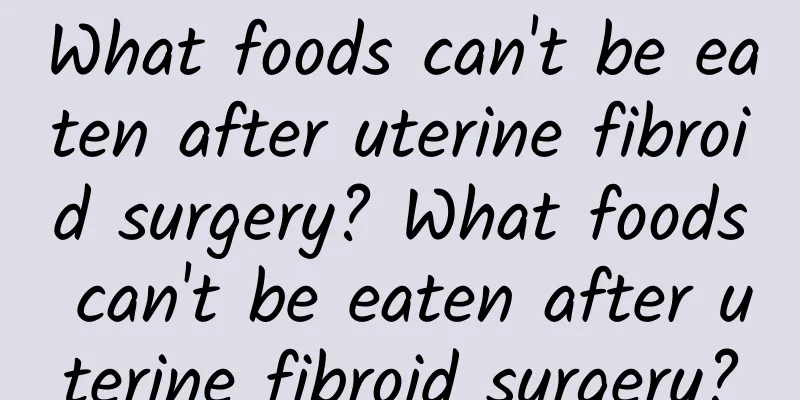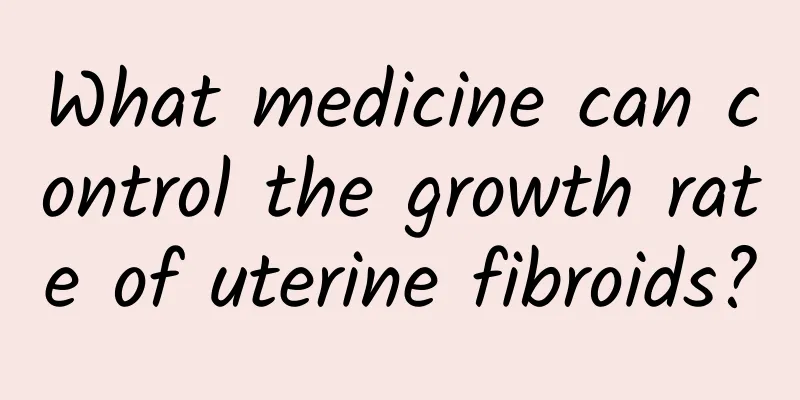What foods can't be eaten after uterine fibroid surgery? What foods can't be eaten after uterine fibroid surgery?

|
What dishes can’t be eaten after uterine fibroid surgery? This is a common question many women have before preparing for surgery. Uterine fibroid surgery is a way to solve the problem of uterine fibroids in women, but the diet before and after surgery is also very important. This article will show you what dishes can’t be eaten after uterine fibroid surgery and what you need to pay special attention to in your diet after surgery. Before we list the foods that you should not eat after uterine fibroid surgery, we first need to understand what uterine fibroids are. Uterine fibroids are a benign tumor that occurs in the myometrium of a woman's uterus, which can cause symptoms such as bleeding, pain, and irregular menstruation. Surgery is a common treatment method, but dietary management before and after surgery is also very important. 1. Peppers and spicy foods: Peppers and spicy foods can stimulate uterine fibroids and increase the risk of bleeding. Therefore, before surgery for uterine fibroids, you should avoid eating peppers, chili sauce, peppercorns and other spicy foods. 2. Pork liver and beef liver: Animal livers such as pork liver and beef liver are rich in vitamin A. If they are eaten immediately after surgery, they will increase the risk of postoperative bleeding. Therefore, animal livers should be avoided before surgery and in the early postoperative period. 3. Coffee and stimulating drinks: Coffee and stimulating drinks such as tea and green tea contain caffeine, which can stimulate uterine fibroids and cause more frequent bleeding. These drinks should be reduced or avoided before and after surgery. After surgery for uterine fibroids, dietary considerations are also very important. Here are some suggestions: 1. Eat more high-fiber foods: High-fiber foods help digestion and defecation, and prevent constipation. Fruits, vegetables, whole grains and beans are all good sources of fiber and should be consumed more. 2. Maintain hydration: Water intake is very important for maintaining normal body functions. Drinking water not only helps the body eliminate waste, but also maintains normal metabolism in the body. Drink at least 8 glasses of water a day to ensure adequate hydration. 3. Control salt intake: Too much salt can cause water retention in the body, causing swelling and discomfort. After surgery, you should control your salt intake, choose fresh ingredients, and avoid processed foods. In summary, what dishes should not be eaten after uterine fibroid surgery and the dietary management after surgery are very important. Avoiding spicy foods such as chili peppers, animal liver and coffee, taking high-fiber foods, maintaining adequate water intake, and controlling salt intake are all helpful for rapid recovery and physical health recovery. We would like to remind women to follow the doctor's instructions and advice before and after surgery, and communicate with the doctor in a timely manner. Only with good dietary management can the risk of uterine fibroids after surgery be minimized and healthy recovery be promoted. |
Recommend
What are the symptoms of adnexitis?
What are the characteristics of the symptoms of a...
How to treat pelvic inflammatory disease
How is pelvic inflammatory disease treated? Pelvi...
What treatments do you know about adnexitis?
What are the treatments for adnexitis? What treat...
Experts introduce the main methods of preventing and treating chronic cervicitis
Clinically, the cause of chronic cervicitis is no...
More than 20% of school children have pot-shaped waists and suffer from chronic diseases when they grow up
Is your baby a fat child? Chinese people are accu...
How to choose a hospital for uterine adnexitis
In clinical practice, some women suffer from adne...
Hormonal imbalance can also lead to irregular menstruation
Women often experience irregular menstruation dur...
What medicine to take for cervical erosion? The correct process of medication treatment for cervical erosion
Female friends should pay attention to the treatm...
The incidence of physiological ovarian cysts
The incidence of physiological ovarian cysts is h...
What is the diet for bilateral polycystic ovaries?
Bilateral polycystic ovary is a very harmful dise...
The main factors for uterine fibroids
Uterine fibroids are a relatively serious gynecol...
How does HCG determine whether a pregnancy is intrauterine or ectopic?
How does HCG determine whether a pregnancy is int...
Stop squatting on the toilet! These 4 actions can get rid of constipation
You clearly have the urge to defecate, but once y...
Western medicine treatment of secondary amenorrhea
Western medicine treatment of secondary amenorrhe...
What are the methods of TCM to treat cervical erosion in women? Women with cervical erosion can try 3 TCM remedies
Traditional Chinese Medicine Treatment of Cervica...









